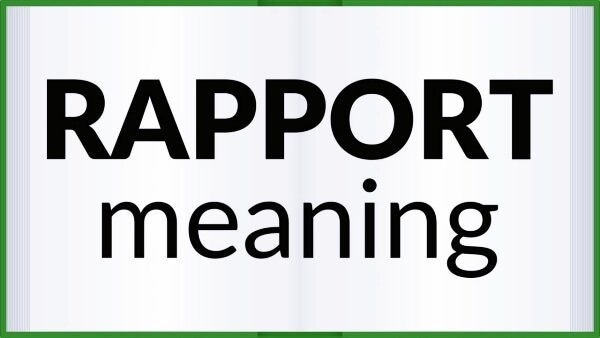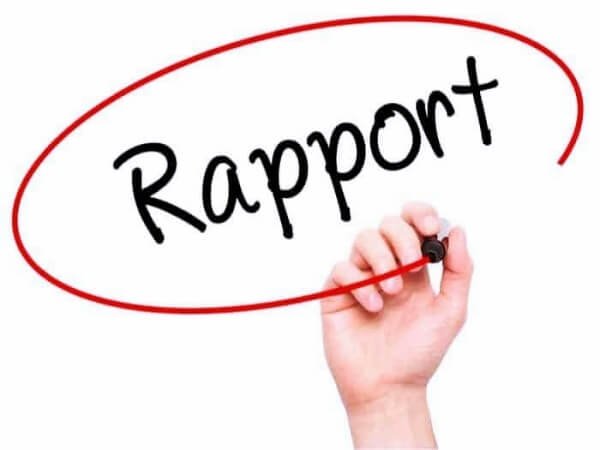Building rapport in an interview is that feeling of connection, a sense that you and the interviewer are on the same wavelength. It’s about building a positive and trusting relationship. In this guide, you will see why rapport is important in an interview, and how you can cultivate it.
Read more: Building Rapport In Interview With Your Potential Employer
Rapport Meaning
Absolutely! In the context of this blog post, rapport refers to a feeling of connection and mutual understanding between you and the interviewer. It’s about building a positive and trusting relationship.
Here’s a breakdown of rapport’s meaning:
- Connection: You and the interviewer feel like you’re on the same wavelength. There’s a sense of ease and friendliness in the conversation.
- Mutual Understanding: You both grasp each other’s perspectives. The interviewer understands your qualifications and interests, and you understand the role and company culture.
- Trust: There’s a feeling of openness and honesty in the interaction. Both of you feel comfortable sharing information and ideas.
You create a more positive interview experience for both yourself and the interviewer, by building rapport. It shows you’re not just a resume on paper, but a personable individual they’d enjoy working with.
Related: Frugal Living Hacks: Cutting Costs Without Sacrificing Quality

Principles Of Building Rapport
Rapport is more than just making a good impression; it’s about fostering a genuine sense of connection. Here are some core principles to guide you:
Put Yourself in Their Shoes
Imagine the interviewer’s perspective. What are they looking for in a candidate? What challenges might they be facing in the role or department? By approaching the interview with empathy, you can tailor your responses to address their needs and demonstrate your ability to understand their viewpoint.
Be Your Genuine Self
While professionalism is crucial, don’t put on a fake persona. Let your personality shine through in a way that feels natural. The interviewer wants to get to know the real you, the person who will be a part of their team.
Find Common Ground
During your research, look for potential areas of common ground with the interviewer or the company. It could be a shared industry experience, a passion for a particular cause, or even a love for the same sports team! Briefly mentioning these shared interests can spark a conversation and create a sense of connection.
Pay Attention and Engage
This goes beyond simply hearing what the interviewer is saying. Truly listen to their questions, delve deeper with thoughtful follow-ups, and demonstrate your interest in the conversation. Active listening shows respect and creates a more engaging dialogue.
Align Your Communication
Your body language and tone of speech communicate volumes. Maintain proper posture, create eye contact, and smile sincerely. Match the interviewer’s energy level (enthusiastic or reserved) without imitating them entirely. This nonverbal alignment promotes trust and closeness.
Building rapport is a continuous process during the interview. By combining these ideas, you will be well on your way to developing a positive rapport with the interviewer and leaving a memorable impression.
Related: Negotiation Nation: Mastering the Art of Getting What You Deserve

How to Build Interview Rapport
Building rapport during an interview extends beyond theory. You’ll need practical techniques to put those ideals into practice and establish a genuine relationship with the interviewer. Here are some concrete recommendations to help you get started:
Preparation is key
- Research the Company: Knowing the company’s culture and beliefs allows you to personalize your responses and identify potential common ground.
- Review the job description: Identify the keywords and talents listed, then prepare examples that demonstrate your qualifications while meeting the company’s needs.
- Practice makes perfect: Rehearse your responses to frequent interview questions, emphasizing clear and succinct communication.
Making a Strong First Impressions:
- Dress Professionally: First impressions are important, so dress correctly for the corporate culture you researched.
- Positive Body Language: Arrive on time, greet the interviewer with a firm handshake and a smile, and keep proper posture and eye contact.
- Be Polite and Enthusiastic: Address the interviewer by name and show your excitement about the chance.
Developing Connection During the Interview:
- Active Listening: Pay attentive attention to the interviewer’s questions and ask pertinent follow-up questions to show your interest.
- Find Common Ground: Briefly mention something you found interesting from your research or a shared industry experience to spark conversation.
- Storytelling is Powerful: Use anecdotes and examples to illustrate your skills and experience in a relatable way.
- Mirror Subtly: Subtly mirroring the interviewer’s body language (posture, not full-on mimicking!) can create a sense of connection.
Remember:
- Be Yourself: Let your personality shine through professionally.
- Be Positive: Maintain a positive and enthusiastic attitude throughout the interview.
- Thank You Note: Following the interview, send a thank-you note to the interviewer, expressing your interest and thanking them for their time.
Following these guidelines and embracing the principles of empathy, authenticity, and active listening will help you create rapport and land your dream job.
Related: Starting Your Investment Journey Without Feeling Overwhelmed

Example of Rapport-Building Interview Questions
While the interviewer assesses you, you can discover more about the organization and the role. Asking insightful questions is an excellent way to exhibit attention and establish rapport. Here are some examples of rapport-building questions to ask during an interview:
The Company Culture:
- “What excites you most about working at [Company Name]?” (Shows genuine interest in the company)
- “What are some of the company traditions or team-building activities you enjoy?” (Provides insight into company culture)
The Role:
- “What are the biggest challenges you see in this role, and how can I best contribute to overcoming them?” (Shows a proactive approach)
- “Can you tell me more about a typical day in this position?” (Helps you visualize the role and responsibilities)
The Team:
- “What qualities do you value most in a successful team member for this role?” (Shows you want to understand team dynamics)
- “Is there an opportunity to mentor or be mentored by someone in this position?” (Highlights your desire for learning and growth)
Finding Common Ground:
- “I noticed on your company website that you’re involved in [cause you support]. Is that something the team is passionate about as well?” (Connects over shared interests)
- “I saw you recently attended a conference on [industry topic]. What were some of the key takeaways you found interesting?” (Sparks conversation based on shared industry knowledge)
Remember:
- Keep it relevant: Align your questions with the conversation and the role you’re interviewing for.
- Be concise: Avoid overly long-winded questions that take away from the interview flow.
- Show real curiosity. Ask open-ended questions to prompt the interviewer to elaborate.
- Asking insightful questions not only provides useful insights but also demonstrates your initiative and ability to interact with others. This can help create rapport and make a good impression on the interviewer.
Related: Gig Economy Jobs That Offer The Best Bang For 2025

Importance Of Rapport During An Interview
Interviews are two-way streets. Sure, you’re there to convince the firm that you’re the best candidate, but it’s also an opportunity for you to determine whether the role and organization are a good fit for you. Here’s why establishing rapport during your interview is critical to getting the job (and finding the proper fit):
Beyond qualifications:
Qualifications and experience are standard expectations in today’s competitive employment market. What distinguishes you is your capacity to connect with the individuals with whom you will be working. Building rapport demonstrates to the interviewer that you are more than simply a résumé, but a personable human with whom they would like to collaborate.
Increased likeability:
People are naturally drawn to those with whom they feel at ease. A solid rapport generates a good impression and makes you remembered to the interviewer. When presented with numerous eligible candidates, the one with whom they felt a connection may have the upper hand.
Trust and Open Communication:
Rapport fosters trust and open communication. The interviewer feels comfortable sharing more details about the role and company culture, allowing you to make a more informed decision. You, in turn, feel comfortable asking insightful questions and expressing your genuine interest in the opportunity.
A Sign of Cultural Fit:
Building rapport demonstrates your ability to connect with others and navigate social situations. This is a strong indicator of how well you’ll fit into the company culture. If you can connect with the interviewer, chances are you’ll be able to build positive relationships with colleagues as well.
A Positive Interview Experience:
Rapport benefits both you and the interviewer. A relaxed and engaging conversation creates a more positive interview experience for everyone involved. You’ll leave feeling good about your chances, and the interviewer will have a more favorable impression of your candidacy.
Related: Cost Of Convenience: Identifying And Eliminating Hidden Expenses

How To Begin A Conversation To Build Rapport
The opening few minutes of your interview establish the tone for the entire conversation. Knowing how to initiate a discussion and establish rapport from the outset can make a great difference. Here are some strategies for starting a conversation that develops a connection with the interviewer:
Acknowledge the interviewer
- A simple greeting: A friendly “Hello, it’s nice to meet you” and a smile go a long way.
- Address them by name. When greeting an interviewer, use their name to show respect.
Positive Comments:
- Complement the Workplace: Briefly mention something positive about the company or the office environment you noticed on your way in. (e.g., “The office has a great atmosphere!”)
- Industry Mention: If relevant, mention a recent industry news piece or event you found interesting. (e.g., “That article about [industry topic] was fascinating. What are your thoughts on it?”)
Lighthearted and Relevant:
- Comment on the Weather: A brief, positive comment about the weather can be a safe conversation starter. (e.g., “Beautiful day, isn’t it?”)
- Keep it brief and avoid dwelling on negative weather conditions.
- Current Events (with Caution): If there’s a positive, industry-related news story, you can briefly mention it. Avoid controversial topics or anything overly personal.
Be Prepared:
Have an Icebreaker Ready: In case the conversation feels forced, have a lighthearted question or comment prepared about the company or the role. Ensure it ties back to your research and avoid generic questions.
Remember:
- Be Genuine: Don’t force a conversation. Let your personality shine through professionally.
- Be Positive: Maintain a positive and enthusiastic demeanor throughout your conversation.
- Keep it Brief: The goal is to break the ice, not delve into deep discussions. Let the interview flow naturally.
You’ll set yourself up for a more positive and successful interview experience, by initiating a conversation that builds rapport.
Related: Side Hustle Showdown: The Best Money-Making Gig For 2025

Effective Tool For Building Rapport.
There are various useful strategies you can use to establish rapport during the interview. Here are some important ones to consider:
Mirroring (subtly):
This does not imply replicating the interviewer’s every action! Mirroring their body language, such as posture or nodding in agreement, might help them feel more connected and comfortable.
Active Listening:
Pay close attention to what the interviewer is saying, ask thoughtful follow-up questions, and summarize key points to demonstrate your genuine interest and understanding.
Finding Common Ground:
During your research, look for potential areas of shared interest with the interviewer or the company. Briefly mentioning these shared passions (industry experience, a cause you support) can spark conversation and create a sense of connection.
Storytelling:
Weaving anecdotes and examples into your responses is a powerful tool. Relatable stories showcase your skills and experiences while making the interview more engaging.
Positive and Enthusiastic Demeanor:
Maintain a smile, make eye contact, and project confidence through your body language. Your enthusiasm for the opportunity will be contagious and create a more positive interview atmosphere.
Asking Insightful Questions
While the interviewer is assessing you, you also have the opportunity to learn more about the company and the role. Asking thoughtful questions demonstrates your interest, initiative, and ability to connect with others. Here are some examples:
- Company Culture: “What excites you most about working at [Company Name]?”
- Role Specifics: “What are the biggest challenges you see in this role, and how can I best contribute to overcoming them?”
- Team Dynamics: “What qualities do you value most in a successful team member for this role?”
You’ll be well on your way to building rapport and making a lasting impression on the interviewer, by incorporating these tools and focusing on genuine connection.
Related: Budgeting Bootcamp: From Zero To Hero In 5 Easy Steps
Conclusion
Building rapport is a two-way street. Be yourself, be polite, and show genuine interest in the opportunity. By implementing these tips, you’ll create a positive connection with your interviewer and increase your chances of landing your dream job.

